Unit13 SectionA GrammarFocus~4c 课件+内嵌视频【新目标九年级Unit 13 We're trying to save the earth】
文档属性
| 名称 | Unit13 SectionA GrammarFocus~4c 课件+内嵌视频【新目标九年级Unit 13 We're trying to save the earth】 |  | |
| 格式 | pptx | ||
| 文件大小 | 63.6MB | ||
| 资源类型 | 试卷 | ||
| 版本资源 | 人教新目标(Go for it)版 | ||
| 科目 | 英语 | ||
| 更新时间 | 2023-12-16 12:31:04 | ||
图片预览

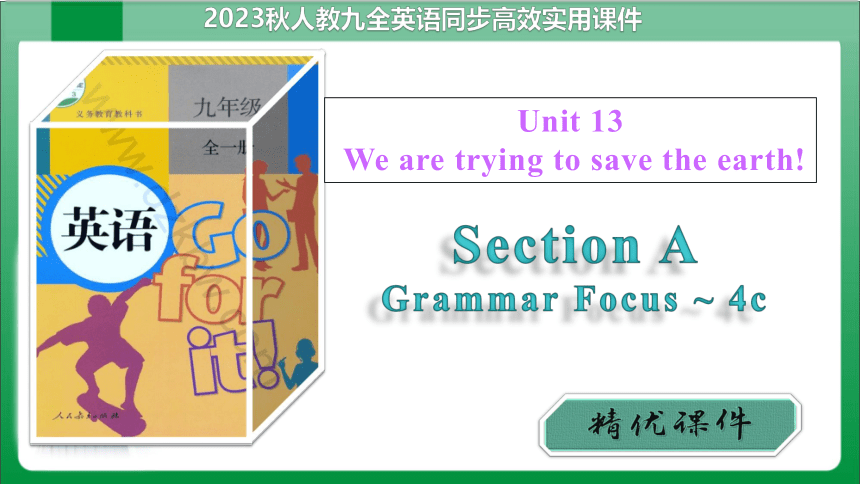
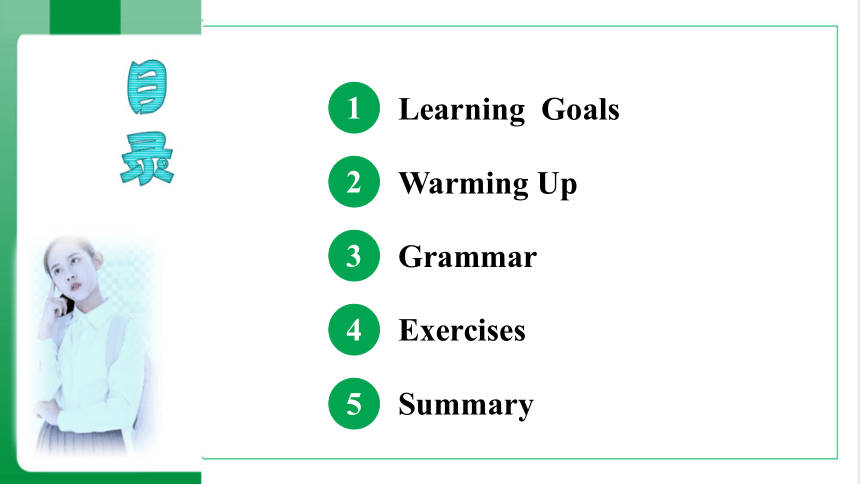
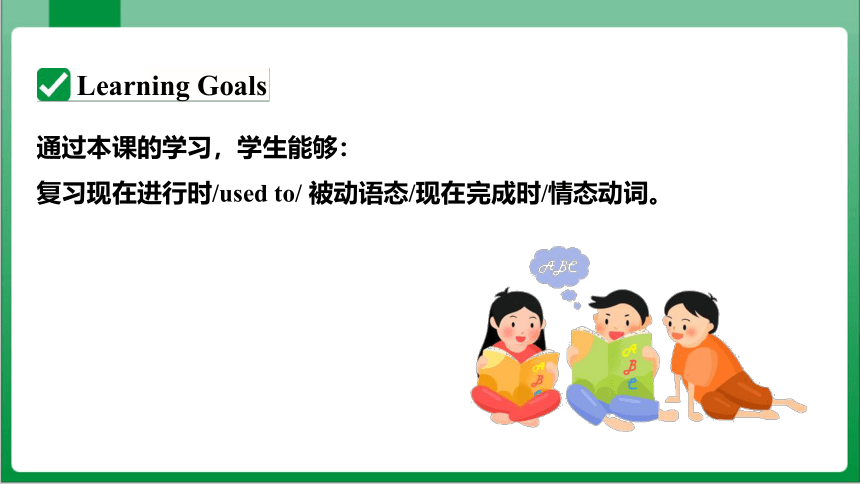
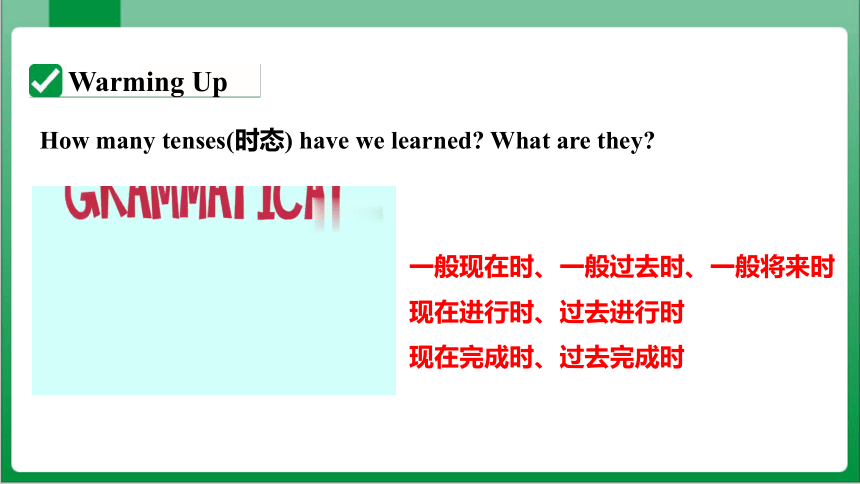
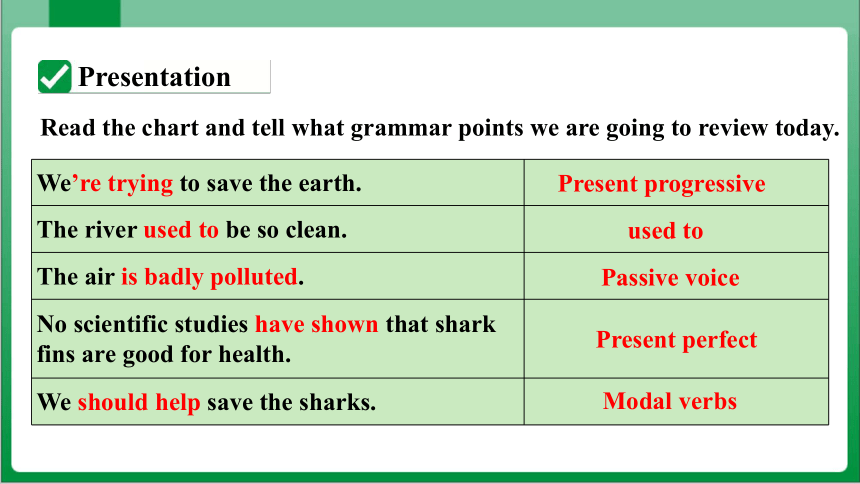
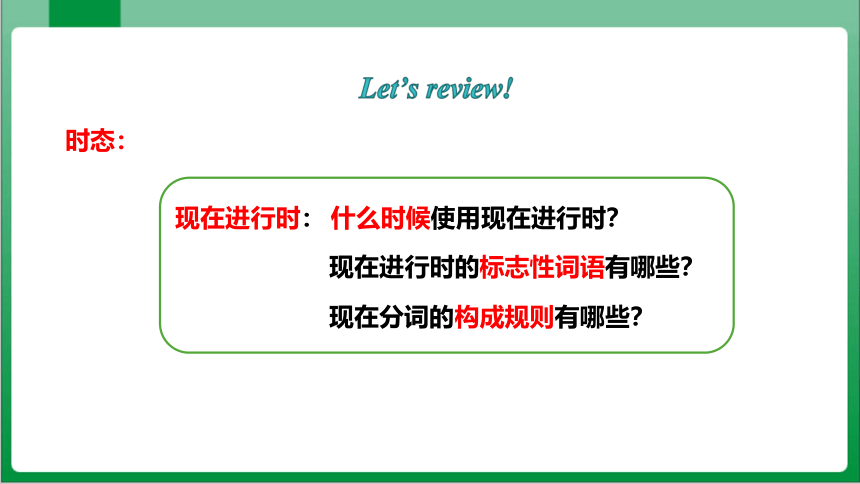
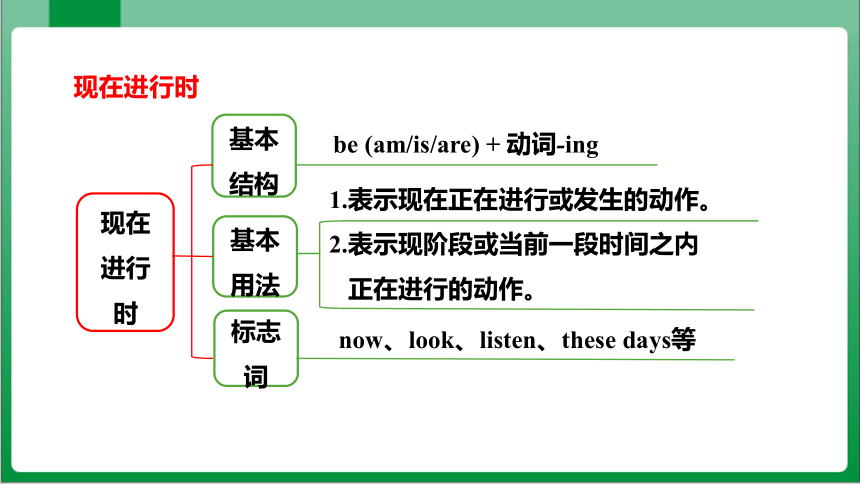
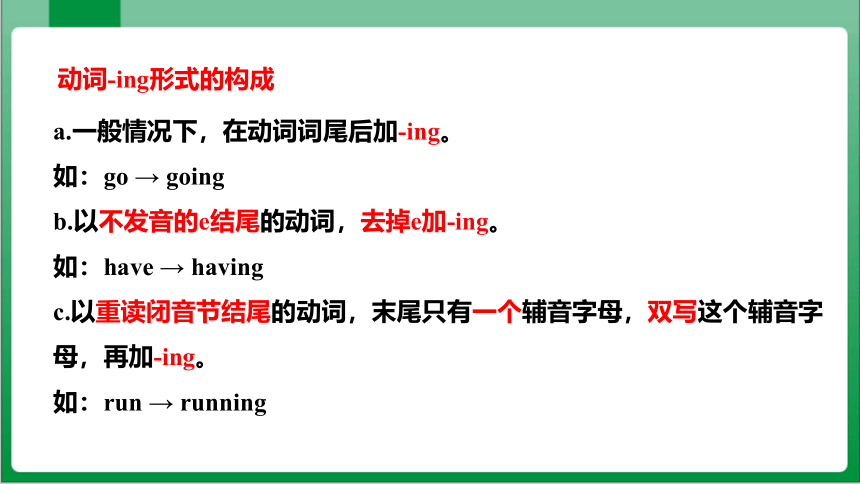
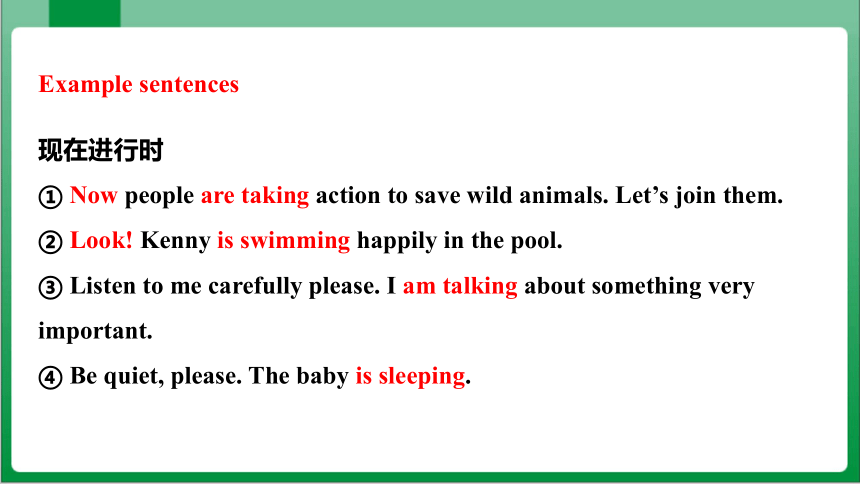
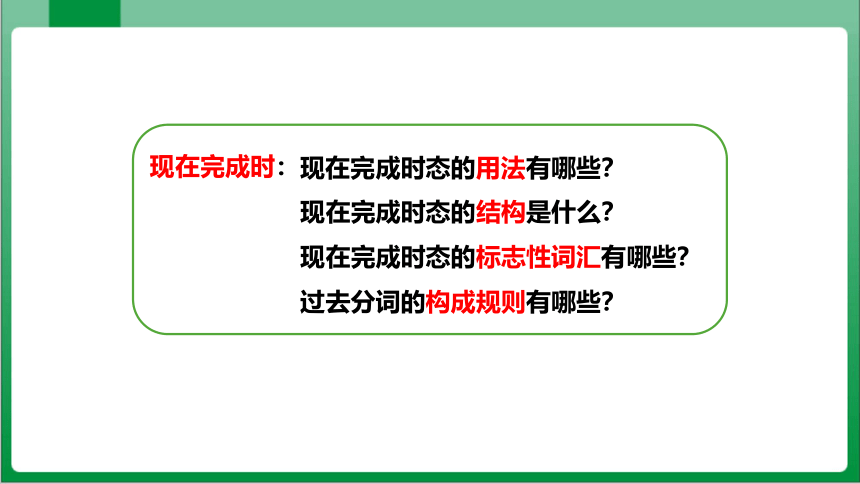
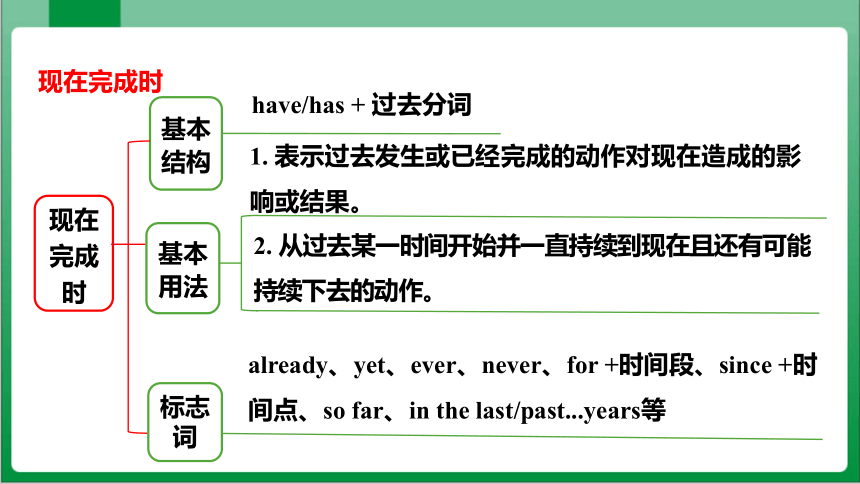
文档简介
(共45张PPT)
人教九全英语同步精品课件
人教版九年级全一册
Unit 13
We are trying to save the earth!
Section A Grammar Focus ~ 4c
Learning Goals
Warming Up
Grammar
Summary
Exercises
1
1
2
3
4
5
通过本课的学习,学生能够:
复习现在进行时/used to/ 被动语态/现在完成时/情态动词。
Learning Goals
How many tenses(时态) have we learned What are they
Warming Up
一般现在时、一般过去时、一般将来时
现在进行时、过去进行时
现在完成时、过去完成时
We’re trying to save the earth.
The river used to be so clean.
The air is badly polluted.
No scientific studies have shown that shark fins are good for health.
We should help save the sharks.
Read the chart and tell what grammar points we are going to review today.
Presentation
Present progressive
used to
Passive voice
Present perfect
Modal verbs
现在进行时:
时态:
Let’s review!
什么时候使用现在进行时?
现在进行时的标志性词语有哪些?
现在分词的构成规则有哪些?
现在进行时
基本
结构
基本
用法
标志词
be (am/is/are) + 动词-ing
1.表示现在正在进行或发生的动作。
2.表示现阶段或当前一段时间之内
正在进行的动作。
now、look、listen、these days等
现在进行时
动词-ing形式的构成
a.一般情况下,在动词词尾后加-ing。
如:go → going
b.以不发音的e结尾的动词,去掉e加-ing。
如:have → having
c.以重读闭音节结尾的动词,末尾只有一个辅音字母,双写这个辅音字母,再加-ing。
如:run → running
现在进行时
① Now people are taking action to save wild animals. Let’s join them.
② Look! Kenny is swimming happily in the pool.
③ Listen to me carefully please. I am talking about something very important.
④ Be quiet, please. The baby is sleeping.
Example sentences
现在完成时:
现在完成时态的结构是什么?
现在完成时态的标志性词汇有哪些?
过去分词的构成规则有哪些?
现在完成时态的用法有哪些?
现在完成时
现在完成时
基本
结构
基本
用法
标志词
have/has + 过去分词
1. 表示过去发生或已经完成的动作对现在造成的影响或结果。
2. 从过去某一时间开始并一直持续到现在且还有可能持续下去的动作。
already、yet、ever、never、for +时间段、since +时间点、so far、in the last/past...years等
过去分词的构成
a.一般情况下,在动词后加-ed。如: work → worked。
b.在以e结尾的动词后只加-d。如: close → closed。
c.以辅音字母加y结尾的动词,应将y改为i再加-ed。如: study → studied。
d.以重读闭音节结尾的动词,要双写末尾的辅音字母再加-ed。如: stop → stopped。
eg. 不规则动词的过去分词:
AAA型 put put put
AAB型 beat beat beaten
ABA型 become became become
ABB型 get got got/gotten
ABC型 begin began begun
现在完成时
① He has kept this book for over two months. Please ask him to return it soon.
② We have lived here since my little sister was born. I like the people here.
③ He has already tried this to solve the problem, but it didn’t work.
Example sentences
被动语态的构成是什么?
一般现在时、 一般过去时、一般将来时和情态动词的被动语态的结构分别是什么?
语态
主动语态和被动语态有什么区别?
主动语态和被动语态的区别
主动语态表示主语是动作的执行者。
被动语态表示主语是动作的承受者,即行为动作的对象。
在含有使役动词 (如:make) 或感官动词 (see、watch、notice、hear等) 的主动语态的句子中,这些词后常跟省略to的动词不定式,但是改为被动语态时则要把省去的to还原。
My room was cleaned by me.
He was seen to cross
the road and enter the shop.
I cleaned my room. →
I saw him cross the road and enter the shop. →
被动语态的构成
被动语态的基本结构:
一般现在时的被动语态:
一般过去时的被动语态:
一般将来时的被动语态:
含情态动词的被动语态:
助动词be + 及物动词的过去分词
am/is/are + 过去分词
was/were + 过去分词
will be/is going to be + 过去分词
情态动词 + be + 过去分词
① Photos and experiences are shared on the microblog.
② The video was sent out quickly and was seen by many schoolmates.
③ In the future, robots will be used by more and more people.
Example sentences
被动语态
Instant Training
1. The girls____________(dance) in the classroom.
2. It’s 5 o’clock now. Mike___________(have) dinner.
3. —________you ever________(be) to the US
—Yes, twice.
4. —May I speak to John
—Sorry, he_________(go) to New York. He will be back in two days.
5. —Do you know Mr. White well
—Yes. He____________(work) for the WWF for two years.
are dancing
is having
been
has gone
has worked
Have
6. I__________(live) here since 1999.
7. —Do you often clean your classroom
—Yes. Our classroom__________(clean) every day.
8. —Did you go to Jack’s birthday party
—No, I______________(not invite).
9. —What is this
—It’s a CD. This CD________(use) for learning English.
10. A new highway in my hometown___________(build) next month.
have lived
is used
wasn’t invited
is cleaned
will be built
情态动词
情态动词
情态动词表示说话人对动作的观点,如需要、可能、意愿或怀疑等,不能单独作谓语,情态动词与助动词一样,后面需要接动词原形构成谓语,它们一般没有人称和数的变化(have to除外)。
常见的情态动词有can, could, may, might, must, have to, should, shall, would, will, need
(1) can/ could
① 表“能力”(此时could是can的过去式)
I can speak English well now but I could’t 10 years ago.
我现在说英语很好但是十年前我不行。
②表“许可”,可表示请求他人许可或许可他人(could 表示委婉语气)
—Could I use your bike —Yes, you can.
③表“推测”
We thought the story could not be true.
It can’t be Mr. Li.
(2) may/ might
①表“许可”,可表示请求他人许可或许可他人(might 表示委婉语气)
You may sit here if you want.
Might I smoke here
②表“推测”,可能性推测(might 表示委婉语气)
She may not like this place.
她可能不喜欢这个地方。
(3) must/ have to
①must表示义务,意为“必须”。在回答must引导的一般疑问句时,肯定回答用must,否定回答用needn’t或don’t have to。mustn’t 表示禁止。
—Must I finish my homework today?我必须今天完成作业吗?
—Yes, you must. 是的,你必须。
(No, you needn’t./No, you don’t have to.不,你不必。)
②表“推测”,肯定推测
The book must be Lily’s because there’s her name on the cover.
这本书一定是莉莉的,因为封面上有她的名字。
对比点 must have to
1.表“必须” (主观看法)必须; 无时态 (客观需要)不得不;
多种时态
2.疑问句 Must I... Yes, you must. (一定) No, you needn’t / you don’t have to. (不必) Do you have to go today
Yes, we do.
You don’t have to worry about that.
(3) shall/ should
①shall用于第一、第三人称,表示征求意见或请求指示
用于第二、第三人称表示“命令”“警告”“强制”“允诺”“决心”
—Shall I let him in (征求意见,请求指示)
—Yes, you shall.(允诺)
②should表示“应该”,常用来表示劝告、建议, 认为“某人应该做某事”或“有义务责任做某事”。
We should take care of the old.
我们应该照顾好老人。
① Ken can climb up trees like a koala.
② Tracy could ride a bicycle when she was five years old.
③ You mustn’t play with fire. It is dangerous.
④ It’s raining outside, so I have to take an umbrella with me.
⑤ As a student, we should obey the school rules.
⑥ The light is on in the office. Someone may be there.
Example sentences
情态动词
Instant Training
A
1. —________you pass me a pen I’d like to write down the phone number.
—Sure. Here it is.
A. Can B. Need C. Might D. Must
2. —May I go to the cinema, Mom
—Certainly, but you________be back by 11 o’clock.
A. Can B. may C. must D. need
C
3. You _______worry about me. It’s nothing serious.
A. can’t B. mustn’t C. needn’t D. won’t
4. —Excuse me. Is this the right way to the Summer Palace
—Sorry, I'm not sure. But it______be.
A. Might B. mustn’t C. can’t D. must
5.The man in the office______be Mr. Black, because he went home just now.
A. mustn’t B. may not C. can’t D. needn’t
C
A
C
1.used to表示什么意思?后接什么?
used to意为“过去常常做某事”,后接动词原形。
2.used to句型的否定句和一般疑问句的形式是什么?
used to句型的否定句形式:didn’t use to...
used to句型的一般疑问句形式:Did + 主语 + use to...
3.used to和be used to的区别是什么?
used to do表示过去常常做某事,而现在往往不做了;
be used to doing表示习惯于做某事。
used to
Example sentences
① James used to wake up late, but now he gets up very early.
② Did Cherry use to live in Shanghai when she was a child
used to
Instant Training
used to hang out
1.她过去常常周末和朋友闲逛。
She_________________________with friends on weekends.
2.他习惯于每天晚上睡得很晚。
He_________________________________at night.
3.Ken used to be afraid of dogs.(改为一般疑问句)
_________________________
is used to sleeping late / staying up
Did Ken use to be afraid of dogs
4a.Fill in the blanks with the correct forms of the verbs in brackets.
Joe: ______ you ever ________ (take) part in an environmental project
Ken: Yes, I have. I _______ (help) with a Clean-Up Day last year. It was __________ (consider) the biggest clean-up project this city______ ever ________ (have).
Joe: How many people ________ (take) part
Have
taken
helped
considered
had
had
took
Practice
Ken: I ___________ (think) more than 1,000 people______(come) to help out.
Joe: That’s fantastic! I guess everyone in this city is______ (try) to improve the environment.
Ken: Yes, we can’t afford to________ (wait) any longer to take action!
think
came
trying
wait
4b.Fill in the blanks with the appropriate modal verbs from the box.
People _________ think that big things__________________ be done to save the earth. Many forget that saving the earth begins with small things. For example, you ______________ save electricity by turning off the lights when you leave a room. You _______________ also use reusable bags instead of plastic bags.
can
would
could
have to
should
must
may/
might
may/might
should/have to/must
can/could/should
can/could/should
can
would
could
have to
should
must
may/
might
I think it’s a great idea that you now _______ pay for plastic bags in some stores. And instead of driving to school or work, you _______________ ride your bike or walk. If it’s far, you __________ take the bus. All these small things __________ add up and become big things that ______________ improve the environment. Let’s take action now!
have to
can/could/should
can/could
can/could
would/can/could
4c. Make a list of things that people can do to help the environment and discuss your list with your partner.
I think that everyone should use public transportation.
I disagree. It’s difficult for parents with young children to use public transportation...
Production
Exercises
一、单项选择。
1.With double reduction policy(双减政策), students _____ less homework now so that they have enough time to take part in more activities.
A.will give B.were given C.are given D.gave
2.— Andy, what were you doing at this time yesterday afternoon
— I the film The Battle at Lake Changjin with my sister.
A.watch B.watched C.was watching D.am watching
C
C
3.During the Tang dynasty(唐朝), nearly everything produced in the world_____on the streets of Chang’an.
A.is found B.has been found C.will be found D.could be found
4.— Mike, I can’t stop playing computer games.
— For your eyes, my dear friend, I’m afraid you .
A.could B.may C.would D.have to
5.— Bruce so much in the past two years.
— Yeah, he be shy, but now he is confident and active.
A.has changed;used to B.changed;is used to
C.changed;used to D.has changed;is used to
D
D
A
二、根据汉语意思完成英语句子。
6.格林先生正在看电视。Mr. Green TV now.
7.这些树是去年种植的。These trees last year.
8.那个国家讲什么语言?What language in that country
9.这条街道过去很脏。 This street be very dirty.
10.我姑姑当护士已经10年了。My aunt _____ _____as a nurse for 10 years.
used to
is watching
were planted
is spoken
has worked
Summary
Grammar: 复习现在进行时、现在完成时、被动语态、情态动词和used to的关键结构和用法
谢谢
21世纪教育网(www.21cnjy.com)
中小学教育资源网站
兼职招聘:
https://www.21cnjy.com/recruitment/home/admin
人教九全英语同步精品课件
人教版九年级全一册
Unit 13
We are trying to save the earth!
Section A Grammar Focus ~ 4c
Learning Goals
Warming Up
Grammar
Summary
Exercises
1
1
2
3
4
5
通过本课的学习,学生能够:
复习现在进行时/used to/ 被动语态/现在完成时/情态动词。
Learning Goals
How many tenses(时态) have we learned What are they
Warming Up
一般现在时、一般过去时、一般将来时
现在进行时、过去进行时
现在完成时、过去完成时
We’re trying to save the earth.
The river used to be so clean.
The air is badly polluted.
No scientific studies have shown that shark fins are good for health.
We should help save the sharks.
Read the chart and tell what grammar points we are going to review today.
Presentation
Present progressive
used to
Passive voice
Present perfect
Modal verbs
现在进行时:
时态:
Let’s review!
什么时候使用现在进行时?
现在进行时的标志性词语有哪些?
现在分词的构成规则有哪些?
现在进行时
基本
结构
基本
用法
标志词
be (am/is/are) + 动词-ing
1.表示现在正在进行或发生的动作。
2.表示现阶段或当前一段时间之内
正在进行的动作。
now、look、listen、these days等
现在进行时
动词-ing形式的构成
a.一般情况下,在动词词尾后加-ing。
如:go → going
b.以不发音的e结尾的动词,去掉e加-ing。
如:have → having
c.以重读闭音节结尾的动词,末尾只有一个辅音字母,双写这个辅音字母,再加-ing。
如:run → running
现在进行时
① Now people are taking action to save wild animals. Let’s join them.
② Look! Kenny is swimming happily in the pool.
③ Listen to me carefully please. I am talking about something very important.
④ Be quiet, please. The baby is sleeping.
Example sentences
现在完成时:
现在完成时态的结构是什么?
现在完成时态的标志性词汇有哪些?
过去分词的构成规则有哪些?
现在完成时态的用法有哪些?
现在完成时
现在完成时
基本
结构
基本
用法
标志词
have/has + 过去分词
1. 表示过去发生或已经完成的动作对现在造成的影响或结果。
2. 从过去某一时间开始并一直持续到现在且还有可能持续下去的动作。
already、yet、ever、never、for +时间段、since +时间点、so far、in the last/past...years等
过去分词的构成
a.一般情况下,在动词后加-ed。如: work → worked。
b.在以e结尾的动词后只加-d。如: close → closed。
c.以辅音字母加y结尾的动词,应将y改为i再加-ed。如: study → studied。
d.以重读闭音节结尾的动词,要双写末尾的辅音字母再加-ed。如: stop → stopped。
eg. 不规则动词的过去分词:
AAA型 put put put
AAB型 beat beat beaten
ABA型 become became become
ABB型 get got got/gotten
ABC型 begin began begun
现在完成时
① He has kept this book for over two months. Please ask him to return it soon.
② We have lived here since my little sister was born. I like the people here.
③ He has already tried this to solve the problem, but it didn’t work.
Example sentences
被动语态的构成是什么?
一般现在时、 一般过去时、一般将来时和情态动词的被动语态的结构分别是什么?
语态
主动语态和被动语态有什么区别?
主动语态和被动语态的区别
主动语态表示主语是动作的执行者。
被动语态表示主语是动作的承受者,即行为动作的对象。
在含有使役动词 (如:make) 或感官动词 (see、watch、notice、hear等) 的主动语态的句子中,这些词后常跟省略to的动词不定式,但是改为被动语态时则要把省去的to还原。
My room was cleaned by me.
He was seen to cross
the road and enter the shop.
I cleaned my room. →
I saw him cross the road and enter the shop. →
被动语态的构成
被动语态的基本结构:
一般现在时的被动语态:
一般过去时的被动语态:
一般将来时的被动语态:
含情态动词的被动语态:
助动词be + 及物动词的过去分词
am/is/are + 过去分词
was/were + 过去分词
will be/is going to be + 过去分词
情态动词 + be + 过去分词
① Photos and experiences are shared on the microblog.
② The video was sent out quickly and was seen by many schoolmates.
③ In the future, robots will be used by more and more people.
Example sentences
被动语态
Instant Training
1. The girls____________(dance) in the classroom.
2. It’s 5 o’clock now. Mike___________(have) dinner.
3. —________you ever________(be) to the US
—Yes, twice.
4. —May I speak to John
—Sorry, he_________(go) to New York. He will be back in two days.
5. —Do you know Mr. White well
—Yes. He____________(work) for the WWF for two years.
are dancing
is having
been
has gone
has worked
Have
6. I__________(live) here since 1999.
7. —Do you often clean your classroom
—Yes. Our classroom__________(clean) every day.
8. —Did you go to Jack’s birthday party
—No, I______________(not invite).
9. —What is this
—It’s a CD. This CD________(use) for learning English.
10. A new highway in my hometown___________(build) next month.
have lived
is used
wasn’t invited
is cleaned
will be built
情态动词
情态动词
情态动词表示说话人对动作的观点,如需要、可能、意愿或怀疑等,不能单独作谓语,情态动词与助动词一样,后面需要接动词原形构成谓语,它们一般没有人称和数的变化(have to除外)。
常见的情态动词有can, could, may, might, must, have to, should, shall, would, will, need
(1) can/ could
① 表“能力”(此时could是can的过去式)
I can speak English well now but I could’t 10 years ago.
我现在说英语很好但是十年前我不行。
②表“许可”,可表示请求他人许可或许可他人(could 表示委婉语气)
—Could I use your bike —Yes, you can.
③表“推测”
We thought the story could not be true.
It can’t be Mr. Li.
(2) may/ might
①表“许可”,可表示请求他人许可或许可他人(might 表示委婉语气)
You may sit here if you want.
Might I smoke here
②表“推测”,可能性推测(might 表示委婉语气)
She may not like this place.
她可能不喜欢这个地方。
(3) must/ have to
①must表示义务,意为“必须”。在回答must引导的一般疑问句时,肯定回答用must,否定回答用needn’t或don’t have to。mustn’t 表示禁止。
—Must I finish my homework today?我必须今天完成作业吗?
—Yes, you must. 是的,你必须。
(No, you needn’t./No, you don’t have to.不,你不必。)
②表“推测”,肯定推测
The book must be Lily’s because there’s her name on the cover.
这本书一定是莉莉的,因为封面上有她的名字。
对比点 must have to
1.表“必须” (主观看法)必须; 无时态 (客观需要)不得不;
多种时态
2.疑问句 Must I... Yes, you must. (一定) No, you needn’t / you don’t have to. (不必) Do you have to go today
Yes, we do.
You don’t have to worry about that.
(3) shall/ should
①shall用于第一、第三人称,表示征求意见或请求指示
用于第二、第三人称表示“命令”“警告”“强制”“允诺”“决心”
—Shall I let him in (征求意见,请求指示)
—Yes, you shall.(允诺)
②should表示“应该”,常用来表示劝告、建议, 认为“某人应该做某事”或“有义务责任做某事”。
We should take care of the old.
我们应该照顾好老人。
① Ken can climb up trees like a koala.
② Tracy could ride a bicycle when she was five years old.
③ You mustn’t play with fire. It is dangerous.
④ It’s raining outside, so I have to take an umbrella with me.
⑤ As a student, we should obey the school rules.
⑥ The light is on in the office. Someone may be there.
Example sentences
情态动词
Instant Training
A
1. —________you pass me a pen I’d like to write down the phone number.
—Sure. Here it is.
A. Can B. Need C. Might D. Must
2. —May I go to the cinema, Mom
—Certainly, but you________be back by 11 o’clock.
A. Can B. may C. must D. need
C
3. You _______worry about me. It’s nothing serious.
A. can’t B. mustn’t C. needn’t D. won’t
4. —Excuse me. Is this the right way to the Summer Palace
—Sorry, I'm not sure. But it______be.
A. Might B. mustn’t C. can’t D. must
5.The man in the office______be Mr. Black, because he went home just now.
A. mustn’t B. may not C. can’t D. needn’t
C
A
C
1.used to表示什么意思?后接什么?
used to意为“过去常常做某事”,后接动词原形。
2.used to句型的否定句和一般疑问句的形式是什么?
used to句型的否定句形式:didn’t use to...
used to句型的一般疑问句形式:Did + 主语 + use to...
3.used to和be used to的区别是什么?
used to do表示过去常常做某事,而现在往往不做了;
be used to doing表示习惯于做某事。
used to
Example sentences
① James used to wake up late, but now he gets up very early.
② Did Cherry use to live in Shanghai when she was a child
used to
Instant Training
used to hang out
1.她过去常常周末和朋友闲逛。
She_________________________with friends on weekends.
2.他习惯于每天晚上睡得很晚。
He_________________________________at night.
3.Ken used to be afraid of dogs.(改为一般疑问句)
_________________________
is used to sleeping late / staying up
Did Ken use to be afraid of dogs
4a.Fill in the blanks with the correct forms of the verbs in brackets.
Joe: ______ you ever ________ (take) part in an environmental project
Ken: Yes, I have. I _______ (help) with a Clean-Up Day last year. It was __________ (consider) the biggest clean-up project this city______ ever ________ (have).
Joe: How many people ________ (take) part
Have
taken
helped
considered
had
had
took
Practice
Ken: I ___________ (think) more than 1,000 people______(come) to help out.
Joe: That’s fantastic! I guess everyone in this city is______ (try) to improve the environment.
Ken: Yes, we can’t afford to________ (wait) any longer to take action!
think
came
trying
wait
4b.Fill in the blanks with the appropriate modal verbs from the box.
People _________ think that big things__________________ be done to save the earth. Many forget that saving the earth begins with small things. For example, you ______________ save electricity by turning off the lights when you leave a room. You _______________ also use reusable bags instead of plastic bags.
can
would
could
have to
should
must
may/
might
may/might
should/have to/must
can/could/should
can/could/should
can
would
could
have to
should
must
may/
might
I think it’s a great idea that you now _______ pay for plastic bags in some stores. And instead of driving to school or work, you _______________ ride your bike or walk. If it’s far, you __________ take the bus. All these small things __________ add up and become big things that ______________ improve the environment. Let’s take action now!
have to
can/could/should
can/could
can/could
would/can/could
4c. Make a list of things that people can do to help the environment and discuss your list with your partner.
I think that everyone should use public transportation.
I disagree. It’s difficult for parents with young children to use public transportation...
Production
Exercises
一、单项选择。
1.With double reduction policy(双减政策), students _____ less homework now so that they have enough time to take part in more activities.
A.will give B.were given C.are given D.gave
2.— Andy, what were you doing at this time yesterday afternoon
— I the film The Battle at Lake Changjin with my sister.
A.watch B.watched C.was watching D.am watching
C
C
3.During the Tang dynasty(唐朝), nearly everything produced in the world_____on the streets of Chang’an.
A.is found B.has been found C.will be found D.could be found
4.— Mike, I can’t stop playing computer games.
— For your eyes, my dear friend, I’m afraid you .
A.could B.may C.would D.have to
5.— Bruce so much in the past two years.
— Yeah, he be shy, but now he is confident and active.
A.has changed;used to B.changed;is used to
C.changed;used to D.has changed;is used to
D
D
A
二、根据汉语意思完成英语句子。
6.格林先生正在看电视。Mr. Green TV now.
7.这些树是去年种植的。These trees last year.
8.那个国家讲什么语言?What language in that country
9.这条街道过去很脏。 This street be very dirty.
10.我姑姑当护士已经10年了。My aunt _____ _____as a nurse for 10 years.
used to
is watching
were planted
is spoken
has worked
Summary
Grammar: 复习现在进行时、现在完成时、被动语态、情态动词和used to的关键结构和用法
谢谢
21世纪教育网(www.21cnjy.com)
中小学教育资源网站
兼职招聘:
https://www.21cnjy.com/recruitment/home/admin
同课章节目录
- Unit 1 How can we become good learners.
- Section A
- Section B
- Unit 2 I think that mooncakes are delicious!
- Section A
- Section B
- Unit 3 Could you please tell me where the restroom
- Section A
- Section B
- Unit 4 I used to be afraid of the dark.
- Section A
- Section B
- Unit 5 What are the shirts made of?
- Section A
- Section B
- Review of Units 1-5
- Unit 6 When was it invented?
- Section A
- Section B
- Unit 7 Teenagers should be allowed to choose their
- Section A
- Section B
- Unit 8 It must belong to Carla.
- Section A
- Section B
- Unit 9 I like music that I can dance to.
- Section A
- Section B
- Unit 10 You're supposed to shake hands.
- Section A
- Section B
- Review of Units 6-10
- Unit 11 Sad movies make me cry.
- Section A
- Section B
- Unit 12 Life is full of the unexpected
- Section A
- Section B
- Unit 13 We're trying to save the earth!
- Section A
- Section B
- Unit 14 I remember meeting all of you in Grade 7.
- Section A
- Section B
- Review of Units 11-14
